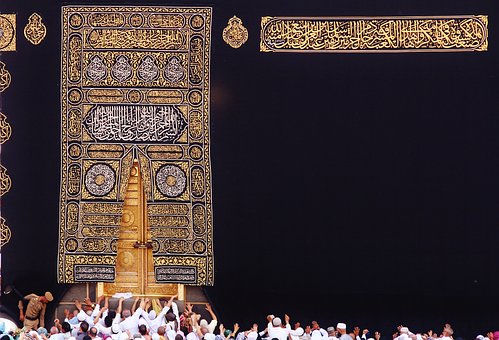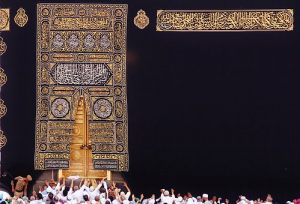Hajj Reflections 5 – the sacrifice of Ismail and sacrificing your will to Allah’s

Yawm At Tarwiyah
On the 8th of Dhul Hijja when Hajjis go to Mina, it is known as the Yawm At Tarwiyah. This name originates from:
1. The process of filling bottles with water to take to Mina. Therefore, when someone is thirsty and then drinks until they are full they are Irtawa i.e. full.
2. The day Ibrahim (peace be on him) saw a vision (Surah As Saffat) from Allah Almighty in which he was asked to sacrifice his son Ismail (peace be on him).
Then, when he was old enough to accompany him, he said, ‘O My son, I see in a dream that I am sacrificing you; see what you think.’ (37:102)
When Ibrahim (peace be on him) told Ismail (peace be on him) of this request, Ismail (peace be on him) replied:
‘He said, “O my Father, do as you are commanded; you will find me, God willing, one of the steadfast.”37.102.
Ibrahim (peace be on him) saw the vision on the 8th and so he began to think, is it from Allah Almighty or is it from Shaytan? Tarawwa means pondering or thinking. The idea was not to rush things but to ponder and think.
The fact that Ibrahim (peace be on him) could think that an idea may have been from Shaytan shows that he (peace be on him) was not arrogant. The vision was repeated three times, so he knew for sure it was from Allah Almighty.
On the third day he took Ismail (peace be on him) to be sacrificed, and this day is known as Yawm Al Nahr day of sacrifice. However, a sheep appeared and Ibrahim (peace be on him) was told to slaughter this instead of Ismail.
And We redeemed him with a great sacrifice. (37:107)
Choosing between Our Will and Allah’s Will
Yawm At Tarwiyah is about how to respond to the call of Allah Almighty.
There are very spiritual dimensions to the religious acts that we do, as they are not just rituals. It is about how we respond to Allah Almighty’s call and put His commands at the top of our priorities – even if we might hate to do them. Who would want to sacrifice his son? The nature of a test is that you may have to do something that you hate.
Hajj tests you by requiring you to sacrifice your wealth, time and leisure to please Allah Almighty. Therefore, Hajj is about training our responses to Allah Almighty’s commands. We need to train ourselves. We are asked to choose between following our likes and Allah Almighty’s commands outside of Hajj as well.
Apply this test whenever choosing – am I bothered about the people or Allah Almighty’s commands?
Following Allah’s Commands Out of Trust
Ibrahim (peace be on him) was the father of the Prophets (peace be on him), yet he was human. Put yourself in his position of being told to sacrifice your son. It is a very hard test – obeying a command from Allah Almighty versus something or someone that you love. This is a test you experience daily in different forms. Do you follow Allah Almighty’s commands or do you follow what you love?
We have to make this choice all the time; it is a real test because to follow Allah Almighty’s command could involve a requirement to overcome your love for your children, who are the peak of your love, or love for things like your job, study or business. So when you have this test are you bothered about the people or reward from Allah Almighty?
Ibrahim (peace be on him) did something very difficult which showed that he had full commitment to Allah Almighty. Now look at this from the point of view of what Ismail (peace be on him) did. He showed full submission and obedience, not because he was following his father’s orders (you have to obey your parents but if asked to do something that isn’t right or very strange you must discuss it with them without being argumentative). He obeyed the order to be a sacrifice not because Ibrahim (peace be on him) was his father but because he was a Prophet (peace be on him). Ismail saw the obedience and trust firstly in Allah Almighty because Ibrahim (peace be on him) was a Prophet (peace be on him) and then secondly in his father Ibrahim (peace be on him).
Over and over again you are taught that you have to trust in Allah Almighty. If He is commanding you to do something, do it and trust Him. One warning to us though – dreams of the Prophets (peace be on him) are commands or revelations whereas dreams of people are not.
Do not just act on your dreams. Dream interpretation is a special science and needs to be done by experts. It is not enough for someone to read Ibn Sireen’s book (which is not really by Ibn Sireen) to be able to interpret dreams. A person that interprets dreams has to have some knowledge of Qur’an and Sunnah and some element of inspiration.
Ismail (peace be on him) didn’t hesitate, he had full trust in Allah Almighty. Just like his mother Hajar (may Allah be pleased with him), right there in Haram, she fully trusted in Allah Almighty. It is important to teach children to have full trust in Allah Almighty.
The Prophet (peace be on him) went to Mina and slept there and left after Fajr on the 9th of Dhul Hijja. On the 8th of Dhul Hijja whilst in Mina there are no rituals except to pray and it is sunnah to sleep there during the nights of Hajj.
Q&A:
Can you do perform tawaf by itself?
You can do tawaf on its own as nafl tawaf but you cannot perform sa’ee on its own. Sa’ee has to be preceded by tawaf.
Shaykh Haytham Tamim – Tafseer Class 4th July 2022
- Connection and self-discovery
- Alone yet united
- Sincerity and obedience
- Transformation and tests
- Choosing between your will and Allah’s
- Waiting, being and having nothing
- Focus and forgiveness
- Emerging from humiliation
- Goodness from pain
- Have deep trust
Recommended Posts

The truth is more powerful than lies
July 26, 2024

Global IT outage. When systems go down…
July 19, 2024


